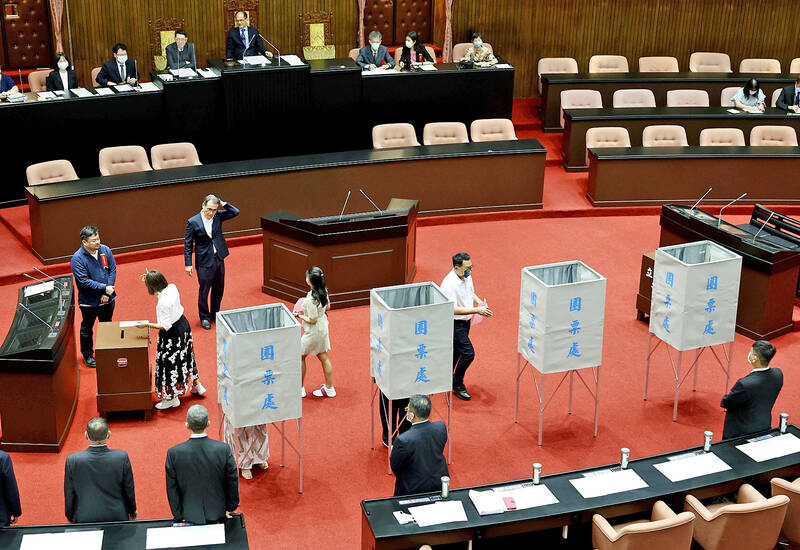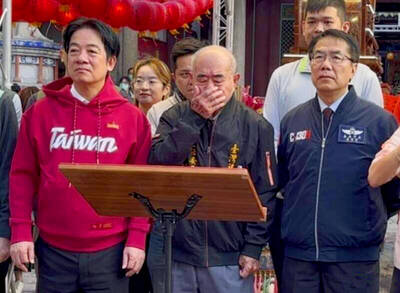Lawmakers yesterday approved all four grand justice nominees proposed by President Tsai Ing-wen (蔡英文) in a vote boycotted by the Chinese Nationalist Party (KMT) and the Taiwan People’s Party (TPP).
Supreme Court Judge Tsai Tsai-chen (蔡彩貞), Control Yuan Secretary-General Chu Fu-mei (朱富美), National Taiwan University law professor Chen Chung-wu (陳忠五) and attorney Greg Yo (尤伯祥) are to fill upcoming vacancies at the Constitutional Court.
Each nominee received at least 60 votes to confirm their appointment, despite the boycott. A grand justice nomination is approved when more than 50 percent of all lawmakers vote in favor of it, which means each nominee required at least 57 votes in the 113-seat legislature.

Photo: CNA
Lawmakers from the ruling Democratic Progressive Party (DPP) and the opposition New Power Party (NPP) participated in the vote.
KMT and TPP lawmakers have said the confirmation process has been “hasty” and “reckless,” as lawmakers were given only 22 days to review the nominations put forth by Tsai at the end of last month.
Yesterday’s approval followed a public hearing and a legislative session on the issue earlier this week.
The TPP in a statement criticized the confirmation process and questioned the affinity between some of the nominees to the DPP government, without elaborating.
The party was likely referring to Yo, as some TPP and KMT legislators have cast doubt on the attorney’s competency to serve as a grand justice.
Yo, 54, is known for providing pro bono services to student protesters charged with storming the Executive Yuan building during the 2014 Sunflower movement against the then-KMT government’s plan to promote greater economic integration with China.
He has worked at government agencies and with civil society groups to promote transitional justice and push for judicial reforms.
The KMT recently accused Yo of encouraging a witness to give false testimony during a court case 18 years ago in which he served as a defense attorney.
He has denied any wrongdoing, adding that he has not been charged with instigating perjury.
The new appointees are to replace grand justices Huang Hung-hsia (黃虹霞), Wu Chen-han (吳陳鐶), Tsai Ming-cheng (蔡明誠) and Lin Chun-i (林俊益) when their terms end on Sept. 30.
Tsai Ing-wen in a statement thanked the legislature for approving her nominations and urged the newly confirmed grand justices to “do their best to safeguard constitutional integrity and protect human rights.”
The Constitutional Court, responsible for interpreting the Constitution and reviewing final court decisions for their constitutionality, comprises 15 grand justices appointed to eight-year terms at staggered intervals.
With the new appointees, the number of women serving as grand justices is to reach a record five.

A New York-based NGO has launched a global initiative to rename the nation’s overseas missions, most of which operate under the name "Taipei," to "Taiwan Representative Office (TRO)," according to a news release. Ming Chiang (江明信), CEO of Hello Taiwan, announced the campaign at a news conference in Berlin on Monday, coinciding with the World Forum held from Monday through Wednesday, the institution stated in the release. Speaking at the event, Democratic Progressive Party Legislator Huang Jie (黃捷) said she believed this renaming campaign would enable the international community to see Taiwan

DEFENSE: The US should cancel the US visas or green cards of relatives of KMT and TPP lawmakers who have been blocking the budget, Grant Newsham said A retired US Marine Corps officer has suggested canceling the US green cards and visas of relatives of opposition Taiwanese lawmakers who have been stalling the review of a proposed NT$1.25 trillion (US$39.7 billion) special defense budget. The Executive Yuan has proposed the budget for major weapons purchases over eight years, from this year to 2033. However, opposition lawmakers have refused to review the proposal, demanding that President William Lai (賴清德) first appear before the Legislative Yuan to answer questions about the proposed budget. On Thursday last week, 37 bipartisan US lawmakers sent a letter to Legislative Speaker Han Kuo-yu (韓國瑜), the heads

TOO DANGEROUS: The families agreed to suspend crewed recovery efforts that could put rescuers in danger from volcanic gases and unstable terrain The bodies of two Taiwanese tourists and a Japanese pilot have been located inside a volcanic crater, Japanese authorities said yesterday, nearly a month after a sightseeing helicopter crashed during a flight over southwestern Japan. Drone footage taken at the site showed three bodies near the wreckage of the aircraft inside a crater on Mount Aso in Kumamoto Prefecture, police and fire officials said. The helicopter went missing on Jan. 20 and was later found on a steep slope inside the Nakadake No. 1 Crater, about 50m below the rim. Authorities said that conditions at the site made survival highly unlikely, and ruled

HYGIENE: People should wash their hands before eating or preparing food, and clean contaminated surfaces with a diluted bleach solution, the CDC said More than 7,500 people sought medical attention for diarrhea during the first three days of the Lunar New Year holiday, the Centers for Disease Control (CDC) said yesterday, adding that nearly 90 percent of the cluster diarrhea outbreaks were caused by norovirus. Norovirus-triggered symptoms drew public attention when a temple manager in Tainan on Wednesday threw up during President William Lai’s (賴清德) visit, with part of the vomit landing on Lai’s left shoulder and arm. The temple manager later said he had contracted norovirus from family members. Hospitals reported 7,581 visits due to diarrhea on the first three days of the Lunar New